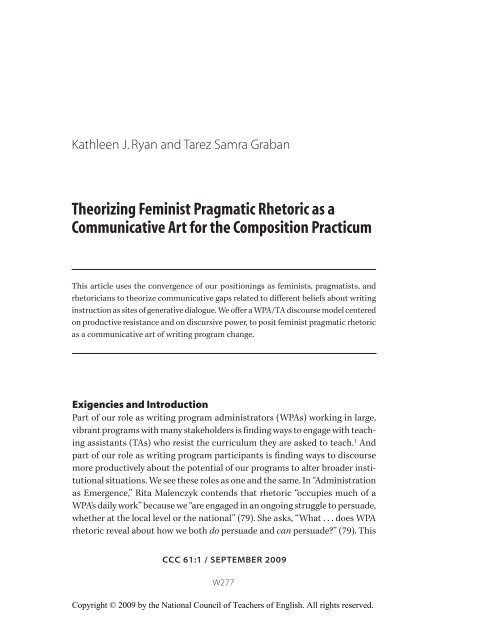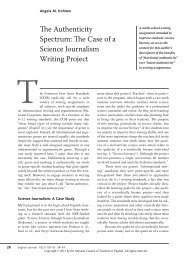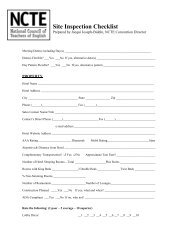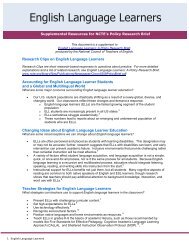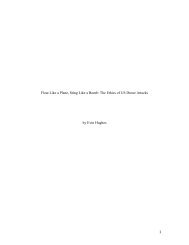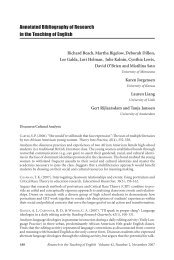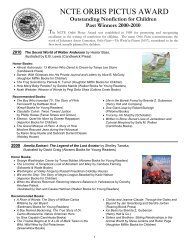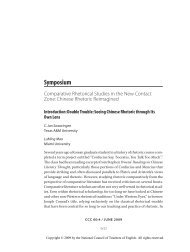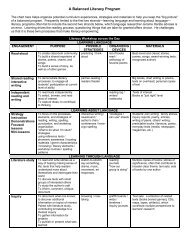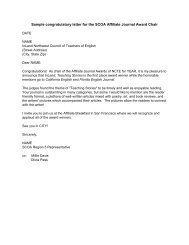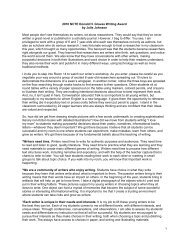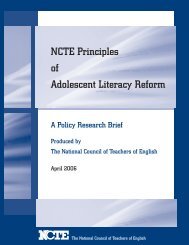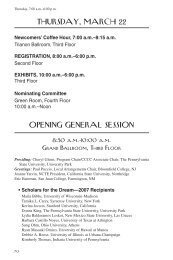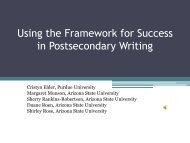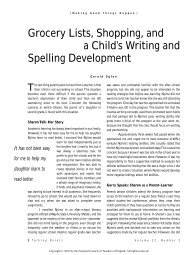Theorizing Feminist Pragmatic Rhetoric as a Communicative Art for ...
Theorizing Feminist Pragmatic Rhetoric as a Communicative Art for ...
Theorizing Feminist Pragmatic Rhetoric as a Communicative Art for ...
You also want an ePaper? Increase the reach of your titles
YUMPU automatically turns print PDFs into web optimized ePapers that Google loves.
y a n a n d g r a b a n / t h e o r i z i n g f e m i n i s t p r a g m a t i c r h e t o r i c<br />
Kathleen J. Ryan and Tarez Samra Graban<br />
<strong>Theorizing</strong> <strong>Feminist</strong> <strong>Pragmatic</strong> <strong>Rhetoric</strong> <strong>as</strong> a<br />
<strong>Communicative</strong> <strong>Art</strong> <strong>for</strong> the Composition Practicum<br />
This article uses the convergence of our positionings <strong>as</strong> feminists, pragmatists, and<br />
rhetoricians to theorize communicative gaps related to different beliefs about writing<br />
instruction <strong>as</strong> sites of generative dialogue. We offer a WPA/TA discourse model centered<br />
on productive resistance and on discursive power, to posit feminist pragmatic rhetoric<br />
<strong>as</strong> a communicative art of writing program change.<br />
Exigencies and Introduction<br />
Part of our role <strong>as</strong> writing program administrators (WPAs) working in large,<br />
vibrant programs with many stakeholders is finding ways to engage with teaching<br />
<strong>as</strong>sistants (TAs) who resist the curriculum they are <strong>as</strong>ked to teach. 1 And<br />
part of our role <strong>as</strong> writing program participants is finding ways to discourse<br />
more productively about the potential of our programs to alter broader institutional<br />
situations. We see these roles <strong>as</strong> one and the same. In “Administration<br />
<strong>as</strong> Emergence,” Rita Malenczyk contends that rhetoric “occupies much of a<br />
WPA’s daily work” because we “are engaged in an ongoing struggle to persuade,<br />
whether at the local level or the national” (79). She <strong>as</strong>ks, “What . . . does WPA<br />
rhetoric reveal about how we both do persuade and can persuade?” (79). This<br />
CCC 61:1 / september 2009<br />
W277
C C C 6 1 : 1 / s e p t e m b e r 2 0 0 9<br />
article represents one response to Malenczyk’s question by theorizing our roles<br />
<strong>as</strong> WPAs who engage resistance in the composition practicum. 2<br />
Our belief that resistance is not antithetical to the learning goals of firstyear<br />
composition causes us to embrace resistance <strong>as</strong> disciplinary negotiation<br />
and pedagogical aim, since even well-run programs encounter resistance that, if<br />
not embraced <strong>as</strong> a site of possibility, can lead to a quiet but perpetual programmatic<br />
undervaluing on the level of communicative and rhetorical ideology. We<br />
focus particularly on the context of the TA practicum to inventively counter<br />
this undervaluing <strong>for</strong> three re<strong>as</strong>ons. First, in our work with writing programs,<br />
especially with TA training, we think we owe it to our TAs, ourselves, and our<br />
discipline to resee what we do <strong>as</strong> training ourselves and them in a kind of civic<br />
discourse and disciplinary critique. Second, <strong>as</strong> Sidney Dobrin and his contributors<br />
indicate in Don’t Call It That, TA training is the primary site that conveys<br />
and creates writing program identity, and thus h<strong>as</strong> far-reaching impact within<br />
and beyond individual writing programs. Third, our own experiences directing<br />
composition and coordinating courses have impelled us to theorize more<br />
deeply about what could constitute healthier TA and WPA relations because<br />
we kept encountering situations that we couldn’t resolve from our positioning<br />
<strong>as</strong> either untenured or graduate student WPAs, yet couldn’t discount <strong>as</strong> valid.<br />
Our own practices leading us to theorize this way have been in<strong>for</strong>med by<br />
such WPA scholarship <strong>as</strong> Ebest’s Changing the Way We Teach and Pytlik and<br />
Liggett’s Preparing College Teachers of Writing. We align ourselves with these<br />
scholars in underwriting the importance of providing graduate students with<br />
conceptual resources they will need to bridge disparate intellectual paradigms<br />
(Ebest; Rose and Finders; Yancey) and proposing the TA preparation course <strong>as</strong><br />
an essential site <strong>for</strong> theory building (Stancliff and Goggin 13). Our work differs<br />
in that we aim to articulate a feminist pragmatic rhetoric <strong>as</strong> a way to invite all<br />
stakeholders to participate more pragmatically in their appointments. To ensure<br />
that we don’t respond with resistance in turn, we must learn to “do critique”<br />
more pragmatically and communicate more productively.<br />
We direct our theorizing, then, toward responding productively to TA<br />
resistance to deal better with such familiar conflicts <strong>as</strong> the following 3 :<br />
• Our TAs go through periods of struggle <strong>as</strong> they negotiate their TAships,<br />
and we take these struggles seriously, just <strong>as</strong> we take their teaching<br />
responsibilities seriously. They might experience the paradox of wanting<br />
to be told what to do without being told what to do or express a<br />
cynicism about learning, including a skepticism that first-year students<br />
W278
y a n a n d g r a b a n / t h e o r i z i n g f e m i n i s t p r a g m a t i c r h e t o r i c<br />
want to be engaged in their cl<strong>as</strong>ses and can learn to be better writers.<br />
While we recognize some of their doubts <strong>as</strong> problematic because of the<br />
<strong>as</strong>sumptions they make about the intellectual work of teaching, we are<br />
uncom<strong>for</strong>table simply discounting them <strong>as</strong> antithetical to practicum<br />
goals.<br />
• Our TAs sometimes view the practicum <strong>as</strong> <strong>for</strong>ced pedagogical initiation<br />
because it’s uncom<strong>for</strong>table to learn while teaching and to embrace an<br />
unfamiliar ideological stance. We want to encourage TAs to position<br />
themselves personally, academically, and professionally in the context<br />
of their practica and composition teaching, but we don’t wish to unintentionally<br />
flatter them into thinking they can teach without training,<br />
or cause them to feign m<strong>as</strong>tery they don’t have. That is, we recognize<br />
how this important theoretical work can seem to interfere with the<br />
day-to-day running of our programs, and that an insider/outsider (or<br />
expert/neophyte) difference in status frames our interactions with TAs<br />
despite our best ef<strong>for</strong>ts to elide it.<br />
• Practica are one site where TA skepticism or resentment about teaching<br />
may cl<strong>as</strong>h with WPA <strong>as</strong>sumptions and desires regarding TA responsibilities.<br />
For many institutions, the ungraded teaching practicum<br />
reflects myriad misperceptions and tensions: that TAships exist merely<br />
to fund graduate education, that teaching distracts TAs from their<br />
“real” work of graduate study, and that program curricula and pedagogical<br />
practices interfere with beliefs that teaching writing is intuitive<br />
or simplistic recipe following. 4 These practica may be marked by poor<br />
attendance, limited participation, or a c<strong>as</strong>ual dismissal of composition<br />
pedagogy. Or, TAs might refuse (or be unable) to believe that theoretical<br />
approaches can help them develop instructional pedagogies to survive,<br />
if not thrive, in their first year of teaching composition. TAs might also<br />
choose not to carry out one or more responsibilities <strong>as</strong>sociated with<br />
their teaching in our programs.<br />
• We want to encourage TAs to take ownership of their own cl<strong>as</strong>srooms<br />
and be responsible program members, but we don’t believe we ever can<br />
or should give up the responsibilities attendant to our WPA roles.<br />
• Even while our job descriptions often include language calling <strong>for</strong> the<br />
supervision of TAs, we—particularly those of us who are untenured,<br />
nontenure track, or graduate student WPAs—find traditional concep-<br />
W279
C C C 6 1 : 1 / s e p t e m b e r 2 0 0 9<br />
tualizations of “power” don’t work <strong>for</strong> us since our practica are frequently<br />
p<strong>as</strong>s/fail courses where we cannot fail TAs <strong>as</strong> we cannot (nor<br />
do we necessarily wish to) dismiss them from their appointments. We<br />
also often lack audiences of experienced TAs who believe in our motivations<br />
and can persuade other TAs of our authority <strong>as</strong> program leaders.<br />
Yet, we don’t like implementing mechanisms of surveillance and don’t<br />
want to see such conflicts <strong>as</strong> disruptive to potential program building.<br />
• We understand that how we conduct our practica does not always align<br />
with our TAs’ <strong>as</strong>sumptions and expectations, and that <strong>for</strong> some TAs the<br />
practicum is the only venue they have <strong>for</strong> expressing angst that comes<br />
from overturned expectations. The practicum may also be the site <strong>for</strong><br />
repressed silences, outbursts, and otherwise surprising responses to<br />
our pedagogy that we don’t always recognize or respond to productively<br />
ourselves.<br />
We could take the path of le<strong>as</strong>t resistance by overlooking these tensions,<br />
capitulating to them, or <strong>as</strong>serting an autocratic authority. Yet, <strong>as</strong> feminists we<br />
are dissatisfied with enacting Foucauldian disciplinary me<strong>as</strong>ures because we<br />
value knowledge gained experientially and dialogically, and we recognize how<br />
subjectivity shapes acts of knowledge making to in<strong>for</strong>m communication. As<br />
rhetoricians we find it counterproductive to capitulate because we value our<br />
discipline and recognize knowledge making <strong>as</strong> contextualized, goal-directed<br />
communication. And <strong>as</strong> pragmatists we think it irresponsible to not react<br />
because we want to use our disciplinary knowledge to create good programs—<br />
productive activity systems where all stakeholders, particularly TAs, are engaged<br />
<strong>as</strong> “insiders.” The convergence of these three positionings impels us to work<br />
towards a stronger understanding among WPAs and TAs of what it means to<br />
be an engaged member of a writing program and teach writing well to counter<br />
programmatic undervaluing, and to model useful institutional critique, the<br />
most compelling dimension of which is to “loo[k] <strong>for</strong> gaps or fissures, places<br />
where resistance and change are possible. Such gaps are often discursive (places<br />
where writing—e.g., policy writing—can be deployed to promote change)”<br />
(Porter et al. 631).<br />
The <strong>Feminist</strong> <strong>Pragmatic</strong> WPA: Toward Dialogic Negotiation<br />
We situate our pragmatism in the context of contemporary (re)readings of<br />
cl<strong>as</strong>sical American pragmatism in composition and rhetoric studies that draw<br />
on the historical ef<strong>for</strong>ts of John Dewey, Charles Peirce, William James, and Jane<br />
W280
y a n a n d g r a b a n / t h e o r i z i n g f e m i n i s t p r a g m a t i c r h e t o r i c<br />
Addams, alongside the more contemporary thinking of neo-pragmatists such<br />
<strong>as</strong> Kenneth Burke, Paulo Freire, and Louise Wetherbee Phelps. In “Kenneth<br />
Burke’s Pragmatism—Old and New,” <strong>for</strong> example, David Blakesley discusses<br />
Burke’s dialectical rhetoric <strong>as</strong> an example of “new pragmatism” <strong>for</strong> its systematic<br />
way of identifying hermeneutic inquiry <strong>as</strong> part of pragmatic/rhetorical<br />
inquiry. Blakesley specifically identifies Burke’s dramatism and emph<strong>as</strong>is on<br />
multivocality <strong>as</strong> a pragmatic/rhetorical model <strong>for</strong> agency and inquiry (88).<br />
Sustaining such multivocality requires that we develop paradigmatic empathy,<br />
a term we use to describe the empathetic and intellectual awareness of<br />
one another’s disciplinary positioning, and here is where we turn more directly<br />
to other feminist pragmatists who have already articulated compelling re<strong>as</strong>ons<br />
to do this b<strong>as</strong>ed on hope. In Re<strong>as</strong>on to Believe, Hephzibah Roskelly and Kate<br />
Ronald recover the American romantic tradition and cl<strong>as</strong>sical American pragmatism<br />
<strong>as</strong> an interwoven philosophy they believe gives us “a re<strong>as</strong>on to believe<br />
in the vocation of teaching and its uses in the world” (27). They claim Freire <strong>as</strong><br />
a romantic pragmatist, particularly through his concepts of conscientization<br />
and praxis and his recognition that hope means struggling rather than wishful<br />
thinking (Ronald and Roskelly 24). And in “The WPA <strong>as</strong> Pragmatist,” Donald<br />
Bushman discusses the pragmatic interaction of experience, reflection, and<br />
action—through Phelps’s description of composition <strong>as</strong> a human science and<br />
through Roskelly and Ronald’s romantic/pragmatic rhetoric—to illustrate writing<br />
program work <strong>as</strong> intellectual. For Bushman, the “pragmatic concern <strong>for</strong> selfunderstanding<br />
through reflection and action is central to the role of the WPA,”<br />
and “seeing the work of WPAs <strong>as</strong> the embodiment of a pragmatist philosophy<br />
. . . provides another way to distance it from the label of mere service” (31). 5<br />
Like Blakesley’s appreciation of agency and dialectic, Roskelly and Ronald’s<br />
hope <strong>for</strong> teaching <strong>as</strong> a vocation, and Bushman’s reconstruction of WPAs <strong>as</strong><br />
scholarly administrators—and the pragmatists these scholars invoke—we also<br />
find hope in pragmatism. And we do not see hope <strong>as</strong> mere wishful thinking, but<br />
rather embrace Dale Jacobs’s explication of Ronald and Roskelly’s conception of<br />
hope <strong>as</strong> something that “combines ‘a liberating utopia’—a vision of the future<br />
toward which we can work—with ‘the scientific analysis of reality’—reflection<br />
on action” (797) in order to motivate ourselves more effectively.<br />
The motivation we have in mind raises hope <strong>for</strong> the institution to “be<br />
[more] sensitized to its users” (Porter et al. 611). Our experiences <strong>as</strong> feminists,<br />
women, and writing program administrators lead us to embrace feminist<br />
pragmatism <strong>as</strong> a hopeful model of working with other people. Feminism and<br />
pragmatic philosophy mutually enrich one another. Feminism offers us, <strong>as</strong><br />
W281
C C C 6 1 : 1 / s e p t e m b e r 2 0 0 9<br />
women, an experiential window into recognizing and resisting oppression.<br />
While pragmatist philosophy embraces experience, pluralism, and re<strong>for</strong>m, feminism<br />
quite firmly directs these values because of our interest in subjectivity. We<br />
recognize the complex ways subjectivity shapes experience, creates knowledge,<br />
and in<strong>for</strong>ms our reflection on the world around us. Pragmatism’s valorization<br />
of human experience <strong>as</strong> a way of knowing and its orientation toward re<strong>for</strong>m<br />
via reflection on experience augment our beliefs <strong>as</strong> feminist rhetors and offer<br />
us a compelling means <strong>for</strong> action.<br />
Quite simply, pragmatism offers us a method to enact our feminist beliefs<br />
since it allows us to involve TAs in pedagogical development while also<br />
maintaining our own program leadership. It proposes genuine interaction <strong>as</strong> a<br />
productive way of involving program participants in the very acts of teaching<br />
and learning that they may resist. The following tenets of pragmatism further<br />
direct our feminist pragmatism: it authorizes inquiry b<strong>as</strong>ed on human experience<br />
that yields contingent truths; it privileges knowledge gained through<br />
an examination of truths tested by experience, rather than me<strong>as</strong>ured against<br />
foundational knowledge; it involves more members of a community in the<br />
inquiry to better the chance of developing useful beliefs; and it understands<br />
beliefs <strong>as</strong> something on which shareholders should be prepared to take action<br />
and <strong>as</strong> habits that can be broken through the introduction of doubt (Jones).<br />
Both feminism and pragmatism resist mainstream philosophy’s dictum<br />
that knowledge is a neutral, certain, objective pursuit in favor of the belief<br />
that knowledge is contextual, experiential, and activity oriented (Seigfried).<br />
Pragmatists focus on imagining alternative communities, on the prospect<br />
of creating “a possibly less painful, dimly seen, future” (Rorty 19), one that<br />
<strong>for</strong> many feminist scholars is the hope <strong>for</strong> equity. Richard Rorty’s merging of<br />
feminist and pragmatic aims articulates our understanding that “feminists who<br />
are also pragmatists” work to create “a better set of social constructs than the<br />
ones presently available . . . [to work toward] the creation of a new and better<br />
sort of human being” (35). To this end, we elaborate on how practicing feminist<br />
pragmatism in composition practica is less concerned that the outcome of a<br />
WPA/TA interaction will result in either of us changing our minds; more likely,<br />
such interaction will provide TAs and WPAs with alternative habits of mind.<br />
Those habits of mind, when modeled and taught, may cause TAs to believe (or<br />
believe again) in the intellectual work of teaching composition and to credit<br />
our disciplinary knowledge and our discipline with offering them ways to better<br />
engage in our practica and better teach in our programs.<br />
W282
y a n a n d g r a b a n / t h e o r i z i n g f e m i n i s t p r a g m a t i c r h e t o r i c<br />
Defining Dialogic Negotiation with Discursive Power and<br />
<strong>Feminist</strong> Subjectivity<br />
We have come to understand that feminist pragmatism offers a dynamic model<br />
<strong>for</strong> action through dialogic negotiation—one that principally takes into account<br />
positioning to enhance our response to resistance and uses that positioning to<br />
move toward more shared programmatic behaviors. Because we do not want<br />
to seek to diffuse TA resistance through threats of real or deferred <strong>for</strong>ce, we<br />
call <strong>for</strong> re-viewing program hierarchies <strong>as</strong> visible structures to rewrite rather<br />
than perpetuate. 6 Not only do we hope to make traditional power relations and<br />
structures in our programs visible (largely to productively critique them), but<br />
we also want to use power “to facilitate, to share power, and to enable both<br />
self and others to contribute” (Miller 82). This is not unlike Phelps’s call <strong>for</strong> a<br />
dynamic “matrix model <strong>for</strong> leadership education in which integrations among<br />
learning modes intersect productively with synchronous learning among<br />
professionals and leaders of different generations” (“Turtles” 29). We likewise<br />
seek to welcome emerging leaders within our programs, creating a group of<br />
TAs who take seriously the teaching of writing and making program development<br />
a shared endeavor among teachers with different kinds and degrees of<br />
experience rather than a solitary WPA endeavor.<br />
Thus, we embrace a WPA/TA discourse that builds on Stephen Yarbrough’s<br />
“discursive power” <strong>as</strong> a compelling, feminist way to teach our TAs to be good<br />
teachers and better members of our writing programs. We offer dialogic negotiation<br />
<strong>as</strong> a feminist pragmatic model of dialogue <strong>for</strong> TAs and WPAs to use in TA<br />
practica where resistance might otherwise stop productive conversation. We<br />
particularly value from Yarbrough the following points: that differences create<br />
gaps, that differences should impel ongoing conversation, that we must try to<br />
understand one another to live in this world, that we must believe others tell<br />
their truths when they speak, and that we speak out of different conditions.<br />
This model h<strong>as</strong> several consequences <strong>for</strong> changing our resistance by<br />
changing our epistemic orientation <strong>as</strong> WPAs and TAs, first by allowing us to<br />
rewrite the power gap between TAs and WPAs <strong>as</strong> more than WPAs having<br />
access to the threat of actual or deferred <strong>for</strong>ce, which Yarbrough describes <strong>as</strong><br />
the traditional conceptualization of power (22–23). Though we do not share<br />
Yarbrough’s discontent with rhetoric’s history of “persu<strong>as</strong>ion to conclusions” or<br />
agree that the best alternative is to replace composition with discourse study<br />
<strong>as</strong> a way of avoiding “taking a position” (11), his discourse theory offers us a<br />
compelling definition of power <strong>as</strong> provisional and helps us note opportunities<br />
<strong>for</strong> program ownership and engagement, if not leadership, by TAs:<br />
W283
C C C 6 1 : 1 / s e p t e m b e r 2 0 0 9<br />
if we are to understand others’ opinions, we have to grant them power. That is,<br />
we have to give them credit, at le<strong>as</strong>t provisionally, <strong>for</strong> being sincere in what they<br />
say—credit <strong>for</strong> articulating real differences. We have to presume that what they<br />
claim . . . is motivated by conditions different from those affecting our own. (33)<br />
Here, Yarbrough’s definition of power “enable[s] and motivate[s] communication”<br />
by helping us re-see points of resistance <strong>as</strong> discursive indicators of different<br />
conditions, not <strong>as</strong> unbridgeable differences (46), and by turning our attention<br />
to beliefs that prevent us from sharing others’ beliefs (4). 7<br />
This willingness to believe others, not unlike Augustinian carit<strong>as</strong>, means<br />
we can enter into conversations with TAs without immediate rejection of their<br />
words because we <strong>as</strong>sume they have an exigence and audience, which are not<br />
hypocritical. However, there is more to making this dialogue productive than<br />
just tolerating different viewpoints. Yarbrough’s dialogic model, suitable in<br />
one-on-one conversations <strong>as</strong> well <strong>as</strong> larger group contexts, draws on Donald<br />
Davidson’s concept of charity: “If we want to understand them [‘the people<br />
with whom we speak’] truly—that is, if we want to know what caused them to<br />
speak <strong>as</strong> they did—we have to take up the attitude [Davidson] calls ‘interpretive<br />
charity’” (Yarbrough 6). This attitude promotes listening and working toward<br />
understanding, not by claiming a Burkean identification but by recognizing<br />
difference <strong>as</strong> a window into pedagogical limitations and possibilities that<br />
helps us hear others even if we do not reach agreement. Like Krista Ratcliffe,<br />
we understand our own theories about curriculum and pedagogy <strong>as</strong> interpretive<br />
processes or identifications (41). We should be more willing to extend<br />
this understanding to our TAs by recognizing their disidentification with our<br />
curricula or program philosophies.<br />
In addition to enabling and motivating communication, Yarbrough’s<br />
discourse model makes other important moves toward re<strong>for</strong>m. For Yarbrough,<br />
discourse is motivated by the perception of difference—wherever contradiction<br />
and conflict manifest, a mediate position is possible and desired (158).<br />
Yarbrough’s “common ground” is, like ours, located in a commitment to an<br />
achievable commonality where the goal is mediation rather than ideological<br />
compromise (178). It recognizes that “the end of communication [is]… one of<br />
rhythmic change that provides stability and sense but depends on openness<br />
and novelty rather than closure and unity” and “that another kind of power can<br />
be produced . . . to keep the conversation going, not to silence it, to proliferate<br />
differences, not er<strong>as</strong>e them, to respond to challenges, not submit to them or<br />
vanquish them” (46–47).<br />
W284
y a n a n d g r a b a n / t h e o r i z i n g f e m i n i s t p r a g m a t i c r h e t o r i c<br />
This approach to discourse strikes us <strong>as</strong> an important teaching and learning<br />
strategy in that “we can alter the grounds of others’ discourse simply by<br />
speaking, introducing new vocabularies and discursive patterns with which<br />
our interpreters will have to contend” (Yarbrough 77). It also offers us a way to<br />
approach gaps with TAs that focuses on valuing our differing material conditions<br />
and looking on our multiple subject positionings <strong>as</strong> how we negotiate with<br />
others in the world. For us, a critical point of convergence between feminism<br />
and pragmatism is in pragmatism’s emph<strong>as</strong>is on instantiated human knowledge<br />
and feminism’s emph<strong>as</strong>is on subjectivity <strong>as</strong> a valid knowledge-making practice.<br />
This convergence isn’t necessarily so obvious in feminist theoretical discourse,<br />
however; in fact, it relies on an emended definition of feminist “subjectivity.” 8<br />
To orient Yarbrough’s discourse theory toward feminist pragmatic ends means<br />
using it to re-imagine Foss and Griffin’s concept of “offering and yielding” (8) <strong>as</strong><br />
hermeneutic and rhetorical strategies that help us participate in “engagement<br />
in an issue rather than persu<strong>as</strong>ion to a belief ” (Ryan and Natalle 70). Like Foss<br />
and Griffin, we long <strong>for</strong> discourse models where interlocutors offer by “sharing<br />
what they know, extending one another’s ide<strong>as</strong>, thinking critically about all<br />
the ide<strong>as</strong> offered, and coming to an understanding of the subject and of one<br />
another” (8). But unlike Foss and Griffin, we find it acceptable that this offering<br />
is a su<strong>as</strong>ive act. We see it <strong>as</strong> a means of engaging all program participants in<br />
dialogue that credits their participation and collaborative potential.<br />
Thus, we appreciate Ryan and Natalle’s move to align Foss and Griffin’s<br />
feminist subjective epistemology—one that resists change and learning from<br />
others—to Lorraine Code’s dialogic model of knowing others, a social science<br />
model “that recognizes the role of subjectivity in its quest to understand how<br />
we know other people” and is critical to our theorizing (75). We see “knowing<br />
others” <strong>as</strong> a feminist philosophical framework that enhances Yarbrough’s<br />
interpretation of Donald Davidson’s work and defines subjectivity <strong>as</strong> critical<br />
to establishing and practicing this way of knowing. Code’s enumeration of<br />
dimensions of subjectivity outlines four relevant conditions <strong>for</strong> constructing<br />
knowledge that in other philosophical systems might otherwise go unnoticed:<br />
historical location, social and linguistic context, creativity, and affectivity and<br />
commitment (46). Where a person “stands”—always amid shifting, sometimes<br />
competing fac tors—describes that person’s subjectivity. Thus, urging our TAs<br />
toward a reciprocal understanding of these learning gaps—in relationship<br />
to teaching and students— requires acknowledging the complexity of their<br />
multiple positioning and of the gaps themselves even <strong>as</strong> it requires teaching<br />
W285
C C C 6 1 : 1 / s e p t e m b e r 2 0 0 9<br />
paradigmatic empathy. We acknowledge their subjectivity and our own <strong>as</strong> instantiated<br />
conditions that we both must learn to negotiate and through which<br />
knowledge can be made and exchanged among WPAs and TAs.<br />
Conjoining <strong>Feminist</strong> Pragmatism with <strong>Rhetoric</strong>al Theory :<br />
Toward an Alternative Destination<br />
But feminist pragmatism isn’t enough to help us traverse those moments where<br />
we cannot credit one another’s beliefs, even when we try to do so but are hampered<br />
by divergent disciplinary affiliations. In other words, while we seek to<br />
respond productively to TA resistance, quite frankly, we find we cannot always<br />
credit our TAs’ claims to truth because of our disciplinary expertise. This stance<br />
is born out of our valorization of equality and our understanding that our discipline<br />
h<strong>as</strong> much to offer TAs—the latter being our particular “claim to truth”<br />
in the pragmatic tradition (we believe TAs need to learn about our discipline<br />
to teach writing well). Like our feminist pragmatic sensibility, our rhetorical<br />
education h<strong>as</strong> also taught us that analytic philosophy is an inadequate model<br />
of knowledge <strong>for</strong> the humanities because it neglects contingencies. The concept<br />
of rhetorical situation, historically defined by Bitzer and Kinneavy, e<strong>as</strong>ily<br />
demonstrates its insufficiency. Fahnestock and Secor also remind us that the<br />
paradigmatic “rhetorical situation” is situated in setting and time, cooperative<br />
between at le<strong>as</strong>t two parties, and reliant upon both physically present and verbally<br />
constructed means of persu<strong>as</strong>ion (177). <strong>Feminist</strong> pragmatists recognize<br />
that rhetorical situation is an important factor in knowledge making without<br />
specifically discussing it <strong>as</strong> do rhetoric scholars.<br />
The concept of rhetorical situation enhances our discursive power via<br />
subjectivity more expansively to account <strong>for</strong> broader contextual conditions,<br />
positionings, and persu<strong>as</strong>ive ends among interlocutors participating in dialogic<br />
negotiation. In general, we don’t consider knowing/using rhetorical knowledge<br />
to be incompatible with su<strong>as</strong>ory approaches in feminist pragmatism. Shannon<br />
Sullivan’s discussion of John Dewey’s definition of truth claims helps us more<br />
com<strong>for</strong>tably locate our disciplinary commitment to rhetorical studies without<br />
giving up discursive power or our feminist ef<strong>for</strong>ts to use it to facilitate re<strong>for</strong>m.<br />
Sullivan discusses how the pragmatic tradition redefines truth claims by producing<br />
the expected “trans<strong>for</strong>mation of experience”:<br />
truth refers to the future career of a judgment and, in particular, the ability of<br />
that judgment to effect an improved transaction between living beings and their<br />
environments. . . . When considering the truth of a claim, one is not <strong>as</strong>king whether<br />
it mirrors reality, but instead whether it satisfies desires and needs. (220)<br />
W286
y a n a n d g r a b a n / t h e o r i z i n g f e m i n i s t p r a g m a t i c r h e t o r i c<br />
Sullivan goes on to write that “with Dewey’s pragmatism, claims can be judged<br />
true or false b<strong>as</strong>ed on the degree to which they promote flourishing in and<br />
through transactions with the world, not on the degree of their transparency<br />
to reality” (224). As feminist pragmatic rhetoricians, then, we situate our<br />
truth claims and our definition of discursive power within the aim of turning<br />
resistance in TA practica to “flourishing in” them to create better teaching<br />
and learning “transactions.” Claims to truth are necessarily linked to feminist<br />
pragmatism’s future orientation; these truth claims are valuable only in<strong>as</strong>much<br />
<strong>as</strong> they help us do the work.<br />
As rhetoricians, we also value this dialogic opportunity to practice argument<br />
<strong>as</strong> “emergence toward the other” (Corder 26) in the hopes of creating<br />
mutual communication rather than discord. For Corder, this communicative<br />
act is only possible when participants show a “readiness to testify to an identity<br />
that is always emerging” and a “willingness to dramatize one’s narrative in<br />
progress be<strong>for</strong>e the other” (26). Like invitational rhetoric, Corderian rhetoric<br />
emph<strong>as</strong>izes the need <strong>for</strong> mutuality in discourse to “free us from the apparent<br />
hopelessness of steadf<strong>as</strong>t arguments contending with each other” (25). This<br />
active hope and ef<strong>for</strong>t to acknowledge where the other stands supports our<br />
feminist pragmatic stance to “abandon authoritative positions” without abandoning<br />
our su<strong>as</strong>ive goals or ends (29).<br />
We do recognize in this discourse a kind of Burkean “willingness to listen”;<br />
however, we do not trade in pragmatic believing or interpretive charity<br />
<strong>for</strong> Burke’s symbolic skepticism. Rather, we augment it with Burke’s willingness<br />
to question long-held beliefs about writing and to interrogate new ones<br />
productively <strong>as</strong> well. This rhetorical practice provides a good starting point<br />
<strong>for</strong> turning our TAs and ourselves from critical pedagogues into program participants,<br />
where participation is not defined <strong>as</strong> con<strong>for</strong>ming to a singular goal<br />
or ideal, but <strong>as</strong> moving toward Atwill’s “alternative destination” by tempering<br />
competitive tendencies in favor of emergent stances. We are thus promoting<br />
a feminist pragmatism that fully embraces rhetoric’s aims, rather than claims<br />
to operate outside of them.<br />
To further this end, we draw from Atwill’s notion of techne <strong>as</strong> productive<br />
knowledge to discuss how the feminist pragmatic WPA is also a rhetor and<br />
rhetorician who urges program participants into trans<strong>for</strong>mative engagement<br />
by practicing trans<strong>for</strong>mative engagement <strong>as</strong> an art. Atwill’s recovery of techne<br />
to cl<strong>as</strong>sify rhetoric <strong>as</strong> productive knowledge shifts historical arguments that<br />
identify rhetoric <strong>as</strong> either theoretical or practical by identifying productive<br />
knowledge <strong>as</strong> a situated rhetorical-epistemic art. Techne disrupts typical defini-<br />
W287
C C C 6 1 : 1 / s e p t e m b e r 2 0 0 9<br />
tions of “subject” <strong>as</strong> static, making it possible <strong>for</strong> a rhetor to invent more fluid<br />
paths purposed toward transgressing epistemological boundaries and rectifying<br />
those transgressions (<strong>Rhetoric</strong> 48). Techne’s aim is “neither to <strong>for</strong>malize a<br />
rigorous method nor to secure and define an object of study but rather to reach<br />
an end by way of a path that can be retraced, modified, adapted, and ‘shared’”;<br />
to be “concerned with the indeterminate and the possible—and that which<br />
presents us . . . with alternative possibilities” (195).<br />
As feminist pragmatists we seek to bring together the valorization of<br />
practice and production in our writing program work, and we find Atwill’s argument<br />
compelling that “to refigure rhetorical studies <strong>as</strong> an art of intervention<br />
and invention is to create a very different cl<strong>as</strong>sroom” (<strong>Rhetoric</strong> 210), one where<br />
students—in this c<strong>as</strong>e TAs—are situated participants in their worlds. <strong>Rhetoric</strong><br />
<strong>as</strong> techne is particularly useful <strong>for</strong> us <strong>as</strong> we imagine fluid subjectivities because<br />
it is, <strong>as</strong> Atwill says, something of an “expert outsider’s” art. That is, it allows<br />
someone to observe, from the boundaries of a given field, the regularities of a<br />
practice towards “decoding” it (“Bodies” 169).<br />
In many ways, while TAs work “inside” our programs, their personal histories<br />
and <strong>as</strong>sumptions about writing and writing pedagogy position them <strong>as</strong><br />
“outsiders” who must learn to navigate new territory. We hope to elide such<br />
simplistic oppositions. Where<strong>as</strong> an administrative strategy grounded (explicitly<br />
or not) in analytic philosophy would require us to <strong>as</strong>sume that TAs simply implement<br />
our curricula and transfer its goals and aims to their cl<strong>as</strong>s once they learn<br />
the theoretical in<strong>for</strong>mation involved, a feminist pragmatic rhetoric recognizes<br />
that practical and productive knowledges are contingent and interpretive and<br />
gives its participants permission to temporarily dwell in our writing programs.<br />
As WPAs, we recognize ourselves <strong>as</strong> makers of programs designed <strong>for</strong> users, TAs<br />
unfamiliar with teaching. What TAs first think teaching writing means (and, in<br />
fact, what we <strong>as</strong> WPAs first think teaching writing teachers means) can evolve in<br />
the course of a single practicum. To ensure that it evolves pragmatically means<br />
repositioning both WPAs and TAs <strong>as</strong> emergent learners. Practically speaking,<br />
this might mean teaching TAs strategies <strong>for</strong> examining a program’s goals <strong>as</strong> a<br />
purposeful, interpretable system with a history and context, rather than <strong>as</strong> a<br />
static set of rules and guidelines.<br />
<strong>Feminist</strong> <strong>Pragmatic</strong> <strong>Rhetoric</strong> <strong>as</strong> a <strong>Communicative</strong> <strong>Art</strong><br />
In so doing, we demonstrate how we have come to terms with dialogic negotiation<br />
<strong>as</strong> a legitimate feminist pragmatic rhetorical act and to offer our<br />
understanding of this activity <strong>as</strong> part of a heuristic that invites TAs and WPAs<br />
W288
y a n a n d g r a b a n / t h e o r i z i n g f e m i n i s t p r a g m a t i c r h e t o r i c<br />
to participate in the practicum differently. By situating our theorizing in<br />
practice, we hope to suggest how our heuristic e<strong>as</strong>es the tensions we noted<br />
at the beginning of this article. This heuristic includes the following dynamic,<br />
interwoven <strong>as</strong>pects: practice charitable interpretation, shift the focus of the TA<br />
practicum from chronological to kairotic time, demonstrate rhetorical power<br />
<strong>as</strong> something we make and share, identify value conflicts <strong>as</strong> opportunities, and<br />
model dialogic negotiation.<br />
Practicing charitable interpretation orients us toward pragmatic collaboration<br />
and institutional critique <strong>for</strong> the sake of re<strong>for</strong>m by differentiating<br />
between resistance and refusal. Here, charitable interpretation means crediting<br />
one another with the belief that we can (re)position and (re)learn, and that we<br />
are capable of choosing to do so. As WPAs, composition/rhetoric scholars and<br />
teachers, we’re committed emotionally and professionally to our discipline<br />
and our programs. Even TAs responsible toward their teaching may not, of<br />
course, share our commitment, our expertise, or our positions <strong>as</strong> program<br />
leaders. And we cannot expect them to. In other words, instead of getting<br />
angry when TAs choose not to complete <strong>as</strong>signed readings or insist that a<br />
mainstream rhetoric text is “inappropriate” <strong>for</strong> their students because it doesn’t<br />
rein<strong>for</strong>ce their own experiences, we must try a new approach: crediting TAs <strong>for</strong><br />
speaking and enacting what they understand to be true by <strong>as</strong>suming that the<br />
conditions in<strong>for</strong>ming what they say are unlike our own, and by understanding<br />
the disciplinary boundaries of our own conditions. This means setting ground<br />
rules early on that articulate how all participants can self-position in the<br />
practicum. We have a right to require TAs to participate, even though we have<br />
defined participation in a more flexible way. While resistance is acceptable,<br />
refusal is not.<br />
Shifting the focus from chronological to kairotic time can position us to<br />
consider temporal limits and possibilities of the TA practicum to deal with the<br />
different urgencies of their day-to-day work alongside our intellectual work.<br />
WPA goals and TA expectations can coexist when we recognize what we can<br />
and cannot achieve in a sixteen-week practicum and that the practicum is a<br />
temporary, contextualized requirement with indeterminate ends. As rhetoricians<br />
we persuade TAs that the program matters by teaching them strategies<br />
<strong>for</strong> understanding the curriculum <strong>as</strong> contextualized in outcomes, albeit ones<br />
that evolve kairotically. Just <strong>as</strong> readers rewrite the texts they read (Rosenblatt),<br />
so too do TAs remake the curriculum they are <strong>as</strong>ked to teach, both in their ongoing<br />
response to it and their creation of pedagogical materials—a particular<br />
context that changes with each new semester and each new group of students.<br />
W289
C C C 6 1 : 1 / s e p t e m b e r 2 0 0 9<br />
The aim of our practicum, then, becomes not to “secure and define an object<br />
of study;” rather, our aim becomes “produc[ing]—an alternative destination”<br />
(Atwill, <strong>Rhetoric</strong> 69) and being willing to teach from it. 9 We can still see in our<br />
practica the robust goal of pedagogical training, but we should accept that this<br />
work will likely result in a different set of goals or outcomes than just those that<br />
we anticipate or establish. For example, rather than introducing a reading like<br />
Freire’s Pedagogy of the Oppressed or Ramanathan and Atkinson’s “Individualism,<br />
Academic Writing, and ESL Writers” early in the practicum to establish a<br />
program philosophy through key theorists, we read them near the end of the<br />
practicum to help us and our TAs reflect on where we have come and where we<br />
may still not align on core ideologies. Resituating a reading that TAs might have<br />
thought too unrealistic or theoretical can better reflect their and our ongoing<br />
experiences and ideals when read later in the semester. Even in such programs<br />
where the ungraded practicum is three credits and yearlong, balancing the<br />
demands of reading and theory building with enacting what TAs often see <strong>as</strong><br />
the more pressing needs of daily lesson plans necessitates that we invite TAs<br />
to enter the disciplinary conversation where they are and to take from it what<br />
they understand. In our programs we are working with up to twenty-five TAs<br />
from disciplines <strong>as</strong> diverse <strong>as</strong> creative writing, American studies, Victorian<br />
literature, and philosophy who are unlikely to become compositionists in a<br />
semester- or even year-long course; however, they can learn to connect relevant<br />
disciplinary questions to their daily teaching and scholarship (e.g., “What is<br />
my craft of composing?” “How much do I intervene in their writing process?”<br />
“Whose notions of ‘voice’ dictate how I read my students’ writing?”). We can<br />
allow them the benefit of discovering the key concepts of a foundational reading<br />
later in their teaching practice when concepts such <strong>as</strong> craft of argument<br />
or process intervention invite in<strong>for</strong>med dissensus.<br />
Demonstrating rhetorical power <strong>as</strong> something we make and share is beneficial<br />
both <strong>for</strong> WPAs who lack or disavow power in the traditional sense and<br />
<strong>for</strong> TAs who need help finding places of (personal and programmatic) power.<br />
In both c<strong>as</strong>es, our TAs may just “do what they want” because they discount our<br />
leadership, or because they have never experienced distributed power and don’t<br />
see what it offers. Instead of promoting their cynicism, we help them become<br />
invested in defining the space in which they teach, the institutional context<br />
in which we all work, and the disciplinary controversies in which we are all<br />
embroiled by the very act of teaching. This movement requires making power<br />
structures more visible and redefining power <strong>as</strong> relational.<br />
W290
y a n a n d g r a b a n / t h e o r i z i n g f e m i n i s t p r a g m a t i c r h e t o r i c<br />
One site <strong>for</strong> this work is in program articulation; we want TAs to recognize<br />
that TA education materials and program documents—from syllabi to<br />
goal statements—are tools <strong>for</strong> program negotiation and that there is benefit<br />
in learning how they were created and how to re-create them. For example,<br />
TAs in Tarez’s practica learned the difficulties of pedagogical articulation<br />
when they collaboratively mapped the program’s goals and outcomes to<br />
each of their <strong>as</strong>signments to consider evaluation criteria <strong>for</strong> writing projects<br />
that they thought were too sophisticated. Tarez’s TAs systematically <strong>as</strong>ked<br />
themselves what the criteria looked like in tangible and nontangible terms and<br />
articulated those criteria <strong>for</strong> multiple audiences, including students, tutors at<br />
the university’s writing center, and different academic and athletic advisors. The<br />
intended outcome w<strong>as</strong> <strong>for</strong> her TAs to learn the art of constructing <strong>as</strong>signment<br />
sheets consistent with programmatic justifications and disciplinary goals and<br />
to learn how to question when conditions made it challenging to enact them.<br />
An unexpected, welcome outcome w<strong>as</strong> that they compiled a set of resources<br />
to p<strong>as</strong>s along to other teachers and curriculum builders who were wrestling<br />
with (or resisting) the same approach. Kate and her TAs collaborated on a retention<br />
ef<strong>for</strong>t to help students in danger of failing cl<strong>as</strong>s change their learning<br />
behaviors. In their practicum, Kate’s TAs discussed their first-year students and<br />
retention problems and Kate shared local retention data. They talked about<br />
how to compose letters inviting students with attendance or work completion<br />
problems to a conference. Instead of Kate sending out a single official letter,<br />
enacting a traditional power role, each TA wrote letters himself or herself b<strong>as</strong>ed<br />
on shared criteria. Thus, the individual most able to make final decisions about<br />
who gets the letter and how the letter is composed is the in<strong>for</strong>med teacher. In<br />
this way, TAs enact their teaching responsibilities and confront <strong>as</strong>sumptions<br />
they might have about students’ abilities to learn or commit to the cl<strong>as</strong>s. TAs<br />
became interested not just in the practical details of a particular project, but<br />
also in the significance of their roles <strong>as</strong> teachers invested in student learning.<br />
Reflexive activities like these model institutional critique <strong>for</strong> the sake of re<strong>for</strong>m,<br />
not critique.<br />
Identifying and naming value conflicts—that is, resistance about who can<br />
teach writing or what can be taught—<strong>as</strong> pedagogical differences and treating<br />
them <strong>as</strong> opportunities <strong>for</strong> conversation about the social, material, and<br />
intellectual conditions that cause them to arise in the first place help us to<br />
incorporate them more systematically into our practica. Paying attention to<br />
our TAs’ vocabulary, using our own vocabulary of generative words to create<br />
W291
C C C 6 1 : 1 / s e p t e m b e r 2 0 0 9<br />
experiential involvement, understanding that the naming our TAs do signals<br />
consciousness, and seeing these principles at work in literacy where thought<br />
and language are always altering reality (Ronald and Roskelly 618) are ways to<br />
work with conflict productively. We see this when working with definitions,<br />
including TA, grading, service, language, and writing. For example, two of Kate’s<br />
TAs, <strong>for</strong>mer editors, held firmly to the value of line-editing student papers until<br />
experience responding to student papers and reading Kearns’s article “Encouraging<br />
Editing” caused them to rethink their approach and adopt his heuristic.<br />
Had Kate insisted TAs respond to student papers uni<strong>for</strong>mly, they probably<br />
would have stopped talking about their experimentation in the practicum. In<br />
this c<strong>as</strong>e, her silence manifested a willingness to hear their ide<strong>as</strong> that created<br />
space <strong>for</strong> dialogue and discovery. Practicing listening—even to silences—<strong>as</strong> an<br />
act of n<strong>as</strong>cent understanding is vital, <strong>as</strong> is committing our practica to practicing<br />
long-term theory knowledge and embracing other avenues or sites <strong>for</strong> building<br />
interest in pedagogical study. Tarez draws on teaching metaphors, the CCCC<br />
position statement on writing, and autoethnography to give her instructors<br />
outlets <strong>for</strong> questioning their roles within a broader perspective. Kate uses Lorraine<br />
Code’s description of subjectivity to help TAs identify and explore their<br />
often-competing roles. Certainly, questions about pay, respect, and responsibility<br />
enter such discussions, providing vital opportunities to practice constructive<br />
critique. It is important to encourage TAs to understand that critiquing the<br />
TA enterprise is acceptable, since our ongoing theory building is indicative of<br />
how we critique it daily, but <strong>as</strong>suming the enterprise to be irrelevant is not.<br />
Modeling dialogic negotiation is our most holistic, elaborated <strong>as</strong>pect of<br />
this heuristic. While we can use the practicum to help our TAs understand how<br />
their p<strong>as</strong>t writerly identities affect their present beliefs about teaching writing,<br />
we should not b<strong>as</strong>e our pragmatic or rhetorical success on how their resultant<br />
identities align with ours. Rather, we should b<strong>as</strong>e our collective success on<br />
how well we all learn to communicate through these beliefs, how well we all<br />
practice intersubjective collaboration, and how strongly we commit to teaching<br />
even with conflicts unresolved. For example, discussing the use of points<br />
versus letter grades <strong>as</strong> value oriented can help TAs identify or dis-identify with<br />
particular ways of thinking about evaluation and perhaps better choose what’s<br />
appropriate in their cl<strong>as</strong>sroom. While we value practical knowledge stemming<br />
from intersubjective positions and reflection on p<strong>as</strong>t experiences, we don’t<br />
privilege a “whatever works” style of teaching that many inexperienced TAs<br />
rely on because it often translates into what is e<strong>as</strong>iest or most familiar versus<br />
what is pedagogically sound. Likewise, TAs’ signs of resistance in our practica<br />
W292
y a n a n d g r a b a n / t h e o r i z i n g f e m i n i s t p r a g m a t i c r h e t o r i c<br />
may reveal their lack of satisfaction, which suggests the “truths” under which<br />
they operate about teaching writing and composition pedagogy are situationally<br />
insufficient <strong>for</strong> them <strong>as</strong> well.<br />
This is notable when TAs argue—often against their personal experience<br />
and disciplinary knowledge—that students should write “the research paper”<br />
only because they need to know it <strong>for</strong> college, or that students who cannot<br />
m<strong>as</strong>ter stylistic devices on the sentence level cannot grapple with complicated<br />
<strong>as</strong>signments. We must use our rhetorical positioning <strong>as</strong> WPAs and rhetorical<br />
theorists to engage our TAs in productive discourse <strong>as</strong> a way of allowing<br />
resistance to emerge dialogically through <strong>as</strong>king questions like “What can or<br />
should first-year composition accomplish?” and “How do you locate yourself<br />
in this conversation, even temporarily?” Responding to questions about how<br />
institutional contexts impact what they do in the cl<strong>as</strong>sroom (i.e., “How much<br />
can or should non-native writers ‘write with an accent’?” or “How do students’<br />
professional identities affect their attitude toward the writing cl<strong>as</strong>s?”) can help<br />
TAs to anticipate the pragmatic difficulties of achieving disciplinary ideals on<br />
particular campuses without implying that those ideals shouldn’t still direct<br />
their teaching.<br />
While we acknowledge the temporal, contextual, and shifting nature of<br />
our theorizing, we value the possibility of participating in it even still. Our ways<br />
of enacting this heuristic aren’t particularly radical, but when taken together<br />
<strong>as</strong> a feminist pragmatic rhetoric, they gain impact and meaning <strong>as</strong> a theory<br />
rather than a loose set of administrative and teaching practices. We say this<br />
because we, like Rose and Weiser, “look to theory <strong>for</strong> its explanatory power—its<br />
power to help understand the problems, situations, and contexts of our work,<br />
thus positioning us to make decisions and take actions b<strong>as</strong>ed on a richer<br />
understanding of their implications” (189). As Yarbrough reminds us, we look<br />
<strong>for</strong> ways to uncover and interrogate shared beliefs that prevent interlocutors<br />
from embracing still further beliefs (2–3). Taken in this light, TA resistance<br />
turns into <strong>as</strong> much a part of the writing program activity system <strong>as</strong> is creating<br />
program documents or handling student plagiarism c<strong>as</strong>es. What results from<br />
our theorizing are WPAs and TAs who become participants in an intellectual<br />
pursuit whose conflicts won’t all get resolved at the end of the day. Their positioning<br />
is neither ignored nor elevated but is acknowledged <strong>as</strong> emergent, and<br />
ours is, too. The consequent program administration is intellectual, theoretical;<br />
it seeks an understanding of the relationship between knowing and doing, and<br />
becomes a site—in fact, can extend to multiple sites (including the committee<br />
table, the emails and hallway conversations, the program documents, and the<br />
W293
C C C 6 1 : 1 / s e p t e m b e r 2 0 0 9<br />
TA training program at large)—<strong>for</strong> ongoing reflection, negotiation, and action.<br />
This negotiation, we feel, gives our TAs and ourselves an important “rhetorical<br />
agility” (Kill 223). It allows us and them to acknowledge their resistance<br />
<strong>as</strong> a productive tension that they must deconstruct and reflect on to position<br />
themselves <strong>as</strong> teachers within their program’s and institution’s context.<br />
Rec<strong>as</strong>ting WPAs <strong>as</strong> <strong>Feminist</strong> <strong>Pragmatic</strong> <strong>Rhetoric</strong>ians<br />
As feminist pragmatists and WPAs, we understand re<strong>for</strong>m to mean a fairly<br />
specific agenda to change composition programs into “something better.” 10<br />
We are particularly concerned with using the site of TA training to create<br />
more humane relationships between WPAs and TAs and—by extension—a<br />
better learning experience <strong>for</strong> the first-year students our TAs teach. We extend<br />
Donald Bushman’s argument <strong>for</strong> c<strong>as</strong>ting WPAs <strong>as</strong> pragmatists to posit WPAs<br />
<strong>as</strong> feminist pragmatic rhetoricians who practice a discourse that offers both a<br />
vision of relating differently to TA resistance in practica and a means to meet<br />
that vision through re<strong>for</strong>m. We further extend Seigfried’s historicized study of<br />
the intersections between American pragmatism and feminism to encourage<br />
our interest in rec<strong>as</strong>ting writing programs <strong>as</strong> spaces <strong>for</strong> using this discourse to<br />
negotiate a “new intellectual and social order” (19). We view our work <strong>as</strong> a starting<br />
point <strong>for</strong> disciplinary negotiation, <strong>as</strong> means with a hoped-<strong>for</strong> consequence.<br />
Because TA education is a critical space to articulate writing program<br />
identity, it is a significant site <strong>for</strong> repositioning WPAs in relationship to these<br />
ambivalent “insiders,” who may well be future composition instructors and<br />
noncomposition colleagues in our own and other institutions, in addition to<br />
being citizens who share their experiences and beliefs about writing publicly.<br />
In general, it includes seeing feminist pragmatic rhetoric <strong>as</strong> a way of offering<br />
new opportunities <strong>for</strong> TAs and WPAs to learn new beliefs and practices<br />
<strong>for</strong> communicating within and about their programs and <strong>for</strong> creating those<br />
programs. When we recognize TA education <strong>as</strong> a dynamic instantiation of<br />
writing programs and re-see gaps <strong>as</strong> sites of possible change, <strong>as</strong> Freirean untested<br />
fe<strong>as</strong>ibility, then we believe we can change the ways we’re viewed and<br />
view ourselves, the ways we view our TAs and they view themselves, the ways<br />
we communicate, the ways we all experience TA education, and thus the way<br />
writing pedagogy is perceived and enacted in our programs and institutions.<br />
As such, writing program administration provides an optimal site <strong>for</strong> practicing<br />
rhetoric <strong>as</strong> an “endeavor” and <strong>for</strong> understanding “persu<strong>as</strong>ion” <strong>as</strong> more broadly<br />
defined (Selzer 280).<br />
W294
y a n a n d g r a b a n / t h e o r i z i n g f e m i n i s t p r a g m a t i c r h e t o r i c<br />
Notes<br />
As we write and work together frequently, we alternate the listing of our names<br />
by <strong>as</strong>cending or descending alphabetical order and not by pre-determined order<br />
of importance.<br />
1. We use the term teaching <strong>as</strong>sistant to mean graduate students whose role in the<br />
cl<strong>as</strong>sroom is instructor of record and whose role in the practicum is that of trainee<br />
or mentee, although we recognize that this term does not adequately describe<br />
their role.<br />
2. We situate this discussion within such ongoing work in rhetoric, writing, and resistance<br />
<strong>as</strong> Kopelson’s “per<strong>for</strong>ming neutrality” in order <strong>for</strong> composition instructors<br />
to demonstrate the exigencies underlying critical thinking; Ebest’s understanding<br />
constructive resistance <strong>as</strong> a process of learning in the TA cl<strong>as</strong>sroom; Kill’s noticing<br />
and evaluating students’ “uptake” on genre <strong>as</strong> a way to encourage authentic<br />
self- or cl<strong>as</strong>sroom-identity; and Butler’s reconfiguring of the writing cl<strong>as</strong>sroom <strong>as</strong><br />
a “countermonument,” or disciplinary space that encourages a kind of push-pull<br />
reflection of its own limitations. We further situate our theorizing in Anderson’s<br />
discussion of agency <strong>as</strong> “praxis,” specifically in his suggestion that rhetorical agency<br />
can (should) reside in lived experience.<br />
3. Changing the rhetorical situation of discourse in the TA practicum does not<br />
replace potential structural changes that can support our ideological stances, such<br />
<strong>as</strong> changing the mentoring practicum from one ungraded credit to a three-credit<br />
graded course, or recommending that mentoring practica give more support and<br />
authority to student WPAs and more accountability to TAs.<br />
4. These perceptions persist despite ongoing research, in and beyond composition<br />
studies, which argues <strong>for</strong> the value of graduate coursework in writing pedagogy. See,<br />
<strong>for</strong> example, Chapman and Tate; Ritter; and the MLA report “Advice to Universities<br />
and Graduate Programs on Graduate Student Rights and Responsibilities.”<br />
5. We see much evidence of the implicit values and practices of pragmatism in<br />
composition and rhetoric from scholars who insist that our theories and teaching<br />
practices mutually rein<strong>for</strong>ce one another. Discussing all such published works goes<br />
beyond the scope of this project; the scholarship we outline briefly here represents<br />
only a few texts that explicitly consider composition and rhetoric <strong>as</strong> pragmatism.<br />
6. Marcia Dickson’s collaborative program, <strong>for</strong> example, stresses the importance of<br />
making power structures visible (148). Sheryl Fontaine and Susan Hunter’s ef<strong>for</strong>ts<br />
to shift the notion of instruction <strong>as</strong> immersion to instruction <strong>as</strong> invitation revises<br />
power dynamics.<br />
7. These are particular instances of the kinds of general resistance Sally Barr<br />
Ebest sketches out via Kearney and Plax in Changing the Way We Teach (7). The<br />
W295
C C C 6 1 : 1 / s e p t e m b e r 2 0 0 9<br />
strategies <strong>for</strong> constructive resistance she suggests are ones we see <strong>as</strong> embracing<br />
pragmatism holistically because they focus on the relationship between experience<br />
and reflection.<br />
8. Our notion of “convergence” differs somewhat from the notion that Chaim<br />
Perelman and Lucie Olbrechts-Tyteca put <strong>for</strong>ward in their New <strong>Rhetoric</strong> and that<br />
(feminist and) communication scholars such <strong>as</strong> Mallin and Anderson have adapted<br />
in order to theorize a more constructive argumentation.<br />
9. To clarify, this does not mean convincing our TAs to be content with unsatisfying<br />
answers to their epistemological queries; nor does it mean permitting them to reject<br />
program standards. The adage “let’s all agree to disagree” is not what we have in<br />
mind, either, <strong>for</strong> it shows a lack of commitment to transgressing the disagreement<br />
and represents the disagreement <strong>as</strong> normative.<br />
10. For more thorough discussion on the benefits of curricular and programmatic<br />
change, see Robert Connors’s “Abolition Debate in Composition” and E. Shelley<br />
Reid’s “Changing <strong>for</strong> the Better.”<br />
Work s Cited<br />
Anderson, Dana. “Toward a Theoretical<br />
Framework <strong>for</strong> Agency.” 59th Annual<br />
Convention on College Composition and<br />
Communication. New Orleans, LA,<br />
4 April 2008.<br />
Atwill, Janet M. “Bodies and <strong>Art</strong>.” <strong>Rhetoric</strong><br />
Society Quarterly 36.2 (Spring 2006):<br />
165–70.<br />
. <strong>Rhetoric</strong> Reclaimed: Aristotle and<br />
the Liberal <strong>Art</strong>s Tradition. Ithaca, NY:<br />
Cornell UP, 1998.<br />
Bamberg, Betty. “Creating a Culture of Reflective<br />
Practice: A Program <strong>for</strong> Continuing<br />
TA Preparation after the Practicum.”<br />
Pytlik and Liggett 147–58.<br />
Bitzer, Lloyd. “The <strong>Rhetoric</strong>al Situation.”<br />
Philosophy and <strong>Rhetoric</strong> 1.1 (Jan. 1968):<br />
1–14.<br />
Blakesley, David. “Kenneth Burke’s Pragmatism—Old<br />
and New.” Kenneth Burke and<br />
the 21st Century. Ed. Bernard L. Brock.<br />
New York: State U of New York P, 1999.<br />
71–95.<br />
Bushman, Donald. “The WPA <strong>as</strong> Pragmatist:<br />
Rec<strong>as</strong>ting Service <strong>as</strong> Human<br />
Science.” WPA: Journal of the Council of<br />
Writing Program Administrators 23.1/2<br />
(1999): 29–44.<br />
Butler, Paul. “Composition <strong>as</strong> Countermonument:<br />
Toward a New Space in Writing<br />
Cl<strong>as</strong>srooms and Curricula.” WPA: Writing<br />
Program Administration 29.3 (2006):<br />
11–24.<br />
Chapman, David W., and Gary Tate. “A<br />
Survey of Doctoral Programs in <strong>Rhetoric</strong><br />
and Composition.” <strong>Rhetoric</strong> Review 5.2<br />
(Spring 1987): 124–86.<br />
Connors, Robert J. “The Abolition Debate in<br />
Composition: A Short History.” Composition<br />
in the 21st Century. Ed. Lynn Z.<br />
Bloom, Donald A. Daiker, and Edward M.<br />
White. Carbondale: Southern Illinois UP,<br />
1996. 47–63.<br />
Corder, Jim W. “Argument <strong>as</strong> Emergence,<br />
<strong>Rhetoric</strong> <strong>as</strong> Love.” <strong>Rhetoric</strong> Review 4.1<br />
(Sept. 1985): 16–32.<br />
W296
y a n a n d g r a b a n / t h e o r i z i n g f e m i n i s t p r a g m a t i c r h e t o r i c<br />
Dickson, Marcia. “Directing without Power:<br />
Adventures in Constructing a Model<br />
of <strong>Feminist</strong> Writing Program Administration.”<br />
Writing Ourselves into the<br />
Story: Unheard Voices from Composition<br />
Studies. Ed. Sheryl Fontaine and Susan<br />
Hunter. Carbondale: Southern Illinois UP,<br />
1993. 140–53.<br />
Dobrin, Sidney, ed. Don’t Call It That: The<br />
Composition Practicum. Urbana, IL:<br />
National Council of Teachers of English,<br />
2005.<br />
Ebest, Sally Barr. Changing the Way That<br />
We Teach: Writing and Resistance in the<br />
Training of Teaching Assistants. Carbondale:<br />
Southern Illinois UP, 2005.<br />
Fahnestock, Jeanne, and Marie Secor. “<strong>Rhetoric</strong>al<br />
Analysis.” Discourse Studies in<br />
Composition. Ed. Ellen Barton and Gail<br />
Stygall. Cresskill, NJ: Hampton P, 2002.<br />
177–200.<br />
Fontaine, Sheryl I., and Susan M. Hunter.<br />
“Inviting Students into Composition<br />
Studies with a New Instructional Genre.”<br />
Culture Shock and the Practice of Profession:<br />
Training the Next Wave in <strong>Rhetoric</strong><br />
and Composition. Ed. Virginia Anderson<br />
and Susan Romano. Cresskill, NJ: Hampton<br />
P, 2006. 197–213.<br />
Foss, Sonya K., and Cindy L. Griffin.<br />
“Beyond Persu<strong>as</strong>ion: A Proposal <strong>for</strong><br />
Invitational <strong>Rhetoric</strong>.” Communication<br />
Monographs 62 (1995): 2–18.<br />
Jacobs, Dale. “What’s Hope Got to Do with<br />
It? Toward a Theory of Hope and Pedagogy.”<br />
JAC 25.4 (2005): 783–802.<br />
Jones, Rebecca. “Enacting <strong>Feminist</strong> Pragmatism<br />
<strong>as</strong> an <strong>Art</strong> of Writing Program<br />
Administration.” 21st Council of Writing<br />
Program Administrators’ Summer Conference.<br />
Chattanooga, TN, 14 July 2006.<br />
Kearns, Edward A. “Encouraging Editing.”<br />
Strategies <strong>for</strong> Teaching First-Year Composition.<br />
Ed. Duane Roen, Veronica Pantoja,<br />
Lauren Yena, Susan K. Miller, and Eric<br />
Waggoner. Urbana, IL: National Council<br />
of Teachers of English, 2002. 566–68.<br />
Kill, Melanie. “Acknowledging the Rough<br />
Edges of Resistance: Negotiation of Identities<br />
<strong>for</strong> First-Year Composition.” College<br />
Composition and Communication 58.2<br />
(Dec. 2006): 213–35.<br />
Kinneavy, James L. A Theory of Discourse.<br />
Englewood Cliffs, NJ: Prentice, 1971. Rpt.<br />
New York: Norton, 1980.<br />
Kopelson, Karen. “<strong>Rhetoric</strong> on the Edge<br />
of Cunning; or, The Per<strong>for</strong>mance of<br />
Neutrality (Re)Considered <strong>as</strong> a Composition<br />
Pedagogy <strong>for</strong> Student Resistance.”<br />
College Composition and Communication<br />
55.1 (Sept. 2003): 115–46.<br />
Malenczyk, Rita. “Administration <strong>as</strong><br />
Emergence: Toward a <strong>Rhetoric</strong>al Theory<br />
of Writing Program Administration.”<br />
The Writing Program Administrator <strong>as</strong><br />
Theorist. Ed. Shirley K. Rose and Irwin<br />
Weiser. Portsmouth, NH: Boynton/Cook,<br />
2002. 79–89.<br />
Mallin, Irwin, and Karrin Varsby Anderson.<br />
“Inviting Constructive Argument.”<br />
Argumentation and Advocacy 36 (Winter<br />
2000): 120–33.<br />
Miller, Hildy. “Postm<strong>as</strong>culinist Directions in<br />
Writing Program Administration.” The<br />
Allyn and Bacon Sourcebook <strong>for</strong> Writing<br />
Program Administrators. Ed. Irene Ward<br />
and William J. Carpenter. New York:<br />
Longman, 2002. 78–90.<br />
Modern Language Association. Committee<br />
on Academic Freedom and Professional<br />
Rights and Responsibilities. “Advice to<br />
Universities and Graduate Programs on<br />
Graduate Student Rights and Responsibilities.”<br />
Spring 1998. 9 May 2007 .<br />
Perelman, Chaim, and Lucie Olbrechts-<br />
Tyteca. The New <strong>Rhetoric</strong>: A Treatise on<br />
Argumentation. Trans. John Wilkinson<br />
W297
C C C 6 1 : 1 / s e p t e m b e r 2 0 0 9<br />
and Purcell Weaver. Notre Dame, IN: U of<br />
Notre Dame P, 1969.<br />
Phelps, Louise Wetherbee. Composition <strong>as</strong> a<br />
Human Science: Contributions to the Self-<br />
Understanding of a Discipline. New York:<br />
Ox<strong>for</strong>d UP, 1988.<br />
. “Turtles All the Way Down: Educating<br />
Academic Leaders.” The Writing<br />
Program Administrator’s Resource: A<br />
Guide to Reflective Institutional Practice.<br />
Ed. Stuart C. Brown and Theresa Enos.<br />
Mahwah, New Jersey: LEA, 2002. 3–39.<br />
Porter, James, Patricia Sullivan, Stuart<br />
Blythe, Jeff Grabill, and Libby Miles.<br />
“Institutional Critique: A <strong>Rhetoric</strong>al<br />
Methodology <strong>for</strong> Change.” College Composition<br />
and Communication 51.4 (June<br />
2000): 610–42.<br />
Pytlik, Betty P., and Sarah Liggett. Preparing<br />
College Teachers of Writing: Histories,<br />
Theories, Programs, Practices. New York:<br />
Ox<strong>for</strong>d UP, 2002.<br />
Ratcliffe, Krista. “Coming Out; or, How<br />
Adrienne Rich’s <strong>Feminist</strong> Theory Complicates<br />
Intersections of <strong>Rhetoric</strong> and<br />
Composition Studies, Cultural Studies,<br />
and Writing Program Administration.”<br />
Teaching <strong>Rhetoric</strong>a: Theory, Pedagogy,<br />
Practice. Ed. Kate Ronald and Joy<br />
Ritchie. Portsmouth, NH: Boynton/Cook,<br />
2006. 31–47.<br />
Reid, E. Shelley. “A Changing <strong>for</strong> the Better:<br />
Curriculum Revision <strong>as</strong> Reflective Practice<br />
in Teaching and Administration.”<br />
WPA: Writing Program Administration<br />
26.3 (Spring 2003): 10–27.<br />
Ritter, Kelly. “Professional Writers/Writing<br />
Professionals: Revamping Teacher Training<br />
in Creative Writing Ph.D. Programs.”<br />
College English 64.2 (Nov. 2001): 205–27.<br />
Ronald, Kate, and Hephzibah Roskelly.<br />
“Untested Fe<strong>as</strong>ibility: Imagining the<br />
<strong>Pragmatic</strong> Possibility of Paulo Freire.”<br />
College English 63.5 (May 2001): 612–32.<br />
Rorty, Richard. “Feminism and Pragmatism.”<br />
The Tanner Lectures on Human<br />
Values. Delivered at the U of Michigan, 7<br />
Dec. 1990.<br />
Rose, Shirley K., and Margaret J. Finders.<br />
“Thinking Together: Developing a Reciprocal<br />
Reflective Model <strong>for</strong> Approaches to<br />
Preparing College Teachers of Writing.”<br />
Pytlik and Liggett 75–85.<br />
Rose, Shirley K., and Irwin Weiser, eds.<br />
The Writing Program Administrator <strong>as</strong><br />
Theorist: Making Knowledge Work. Portsmouth,<br />
NH: Boynton/Cook, 2002.<br />
Rosenblatt, Louise M. The Reader, the Text,<br />
the Poem: The Transactional Theory of<br />
the Literary Work. 1978. Carbondale:<br />
Southern Illinois UP, 1994.<br />
Roskelly, Hephzibah, and Kate Ronald. Re<strong>as</strong>on<br />
to Believe: Romanticism, Pragmatism,<br />
and the Possibility of Teaching. Albany:<br />
State U of New York P, 1998.<br />
Ryan, Kathleen J., and Elizabeth J. Natalle.<br />
“Fusing Horizons: Standpoint Hermeneutics<br />
and Invitational <strong>Rhetoric</strong>.”<br />
<strong>Rhetoric</strong> Society Quarterly 31.2 (Spring<br />
2001): 69–90.<br />
Seigfried, Charlene Haddock. Pragmatism<br />
and Feminism: Reweaving the Social<br />
Fabric. Chicago: U of Chicago P, 1996.<br />
Selzer, Jack. “<strong>Rhetoric</strong>al Analysis: Understanding<br />
How Texts Persuade.” What<br />
Writing Does and How It Does It. Ed.<br />
Charles Bazerman and Paul Prior. Hillsdale,<br />
NJ: Erlbaum, 2003. 279–307.<br />
Stancliff, Michael, and Maureen Daly Goggin.<br />
“What’s <strong>Theorizing</strong> Got to Do with<br />
It? Teaching Theory <strong>as</strong> Resourceful Conflict<br />
and Reflection in TA Preparation.”<br />
WPA: Writing Program Administration<br />
30.3 (Spring 2007): 11–28.<br />
Sullivan, Shannon. “The Need <strong>for</strong> Truth: Toward<br />
a <strong>Pragmatic</strong>-<strong>Feminist</strong> Standpoint<br />
Theory.” <strong>Feminist</strong> Interpretations of John<br />
W298
y a n a n d g r a b a n / t h e o r i z i n g f e m i n i s t p r a g m a t i c r h e t o r i c<br />
Dewey. Ed. Charlene Haddock Seigfried.<br />
University Park: Pennsylvania State UP,<br />
2002. 210–35.<br />
Yancey, Kathleen. “The Professionalization<br />
of TA Development Programs: A<br />
Heuristic <strong>for</strong> Curriculum Design.” Pytlik<br />
and Liggett 63–74.<br />
Yarbrough, Stephen R. After <strong>Rhetoric</strong>: The<br />
Study of Discourse beyond Language and<br />
Culture. Carbondale: Southern Illinois<br />
UP, 1999.<br />
K athleen J. Ryan<br />
Kathleen J. Ryan is <strong>as</strong>sistant professor of English and the director of composition at<br />
the University of Montana, where she teaches the TA practicum. Her articles have<br />
appeared in WPA: Writing Program Administration, Composition Studies, <strong>Rhetoric</strong><br />
Review, and <strong>Feminist</strong> Teacher.<br />
Tarez Samra Graban<br />
Tarez Samra Graban is <strong>as</strong>sistant professor of English at Indiana University, where<br />
she teaches rhetoric, writing, and public discourse and coordinates first-year<br />
composition <strong>for</strong> multilingual writers. Her articles have appeared in WPA: Writing<br />
Program Administration, <strong>Rhetoric</strong>a, and Writing on the Edge.<br />
W299


